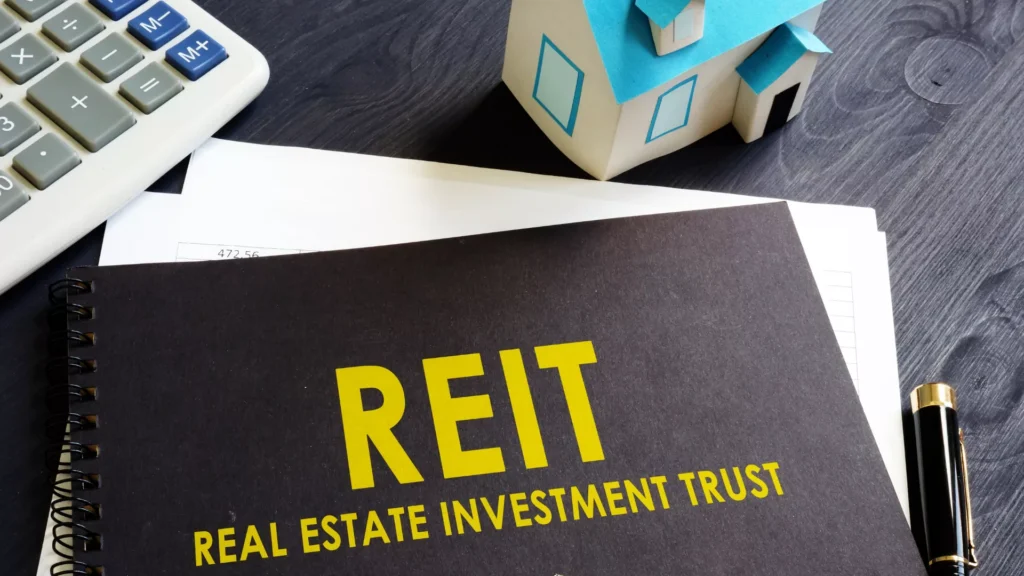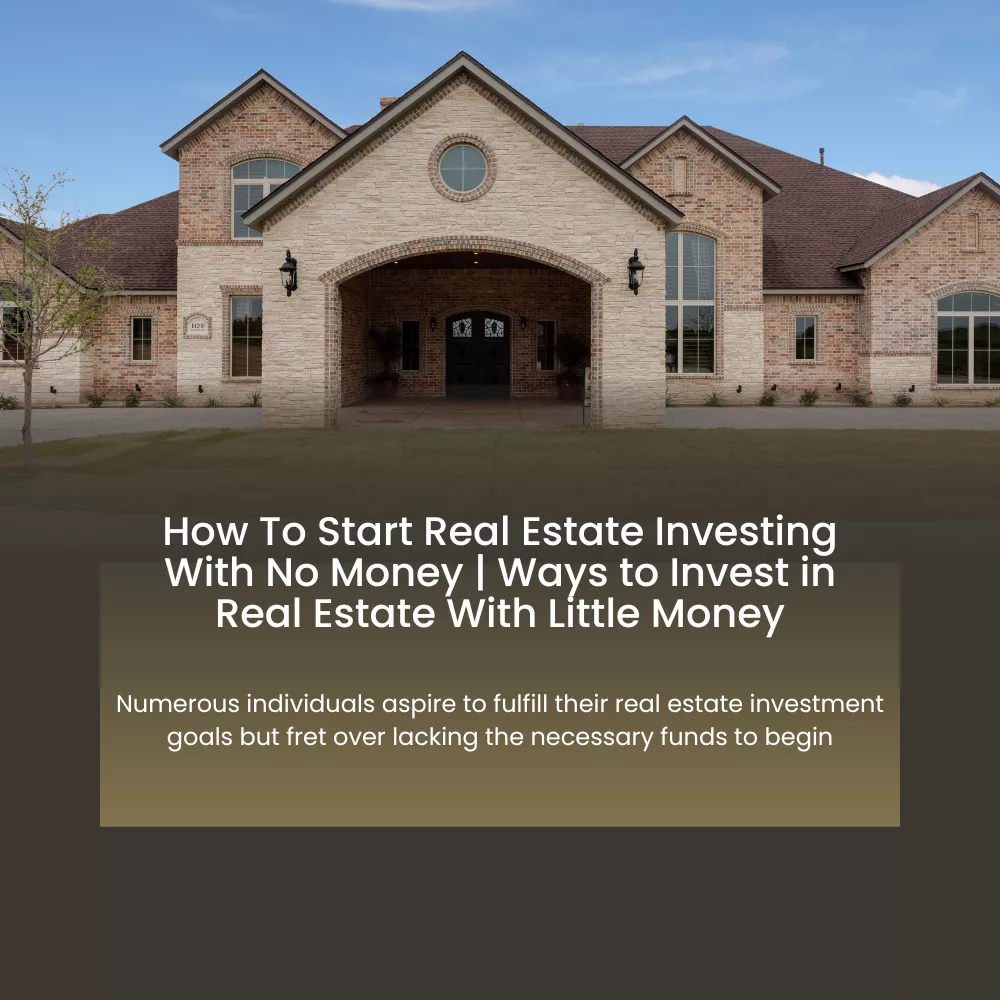Many dream of making real estate investing dreams come true but worry they don’t have the funds to start. Are you one of them? Are you also considering real estate as an investment avenue? Believe it or not, strategies exist that allow for investing with minimal or no upfront capital. Our guide will unveil these tactics, showing you the path to property investment without a hefty bank balance.
Find out how to start real estate investing with no money. Dive in and discover how your real estate ambitions can take flight today!
Understanding Real Estate Investing
Investing in real estate means putting your money into properties to make more money. People do this by buying a home or building and then making money from it, like when someone pays them rent.
It can also mean fixing up a place and selling it for more than you paid.
Investing in real estate is an asset that can be accessed by many other ways and not just buying houses; there are lots of ways to do it. You can own part of big buildings or malls without having the whole thing. Some people put their money into funds that own many properties, which is called a Real Estate Investment Trust (REIT).
This way, they don’t have to choose just one property and still get some of the rent money back as income.
How to Start Real Estate Investing With No Money or Little Money – Is It Possible?
After learning about the basics of investing in real estate, you might wonder if you need a lot of private money to buy real estate entities and get started. The truth is, even with no money in your bank account, there are ways to get started in real estate investments.
Some people use creative ways like house hacking or finding partners who have money to invest. You can also look into seller financing, where the person selling the property helps you pay for it over time.
Another way is through programs like USDA loans and SBA 504 loans that help people buy property with very small down payments or sometimes none at all. There’s also something called REITs which let you put your money into real estate just like buying stocks, without needing lots of cash upfront.
So yes, starting investing in commercial real estate directly despite of not having your own big pile of cash is possible if you’re willing to think outside the box and work hard at it.
Strategies for Investing in Real Estate With Little or No Money
The saying “It takes money to make money” is partially true in the case of the real estate industry, because in certain cases, real estate investors start small. Discover inventive strategies that empower many real estate investors who aspire to start building their portfolio without using money out of pockets of their own or others, and dive deeper into the possibilities that await starting with little to no financial starting point. Here are some tactics to for many aspiring real estate investors to get started with avenues like buying investment properties with no money or bad credit, low funds, etc.
House Hacking
House hacking is a smart move for people who want to dive into investing in real estate in the absence of of cash. You buy a property with more than one unit, live in one part, and rent out the rest.
This way, your tenants pay your mortgage or at least a big part of it. It means you can save money while learning how to be a landlord.
Many investors find house hacking cool because it’s like training wheels for bigger deals. Plus, using the BRRRR method – buying, rehabbing, renting, refinancing and repeating – fits perfectly with house hacking.
As you make money from rent, you might even pull together enough cash to purchase an investment property.
Master leases and other lease options offer another path to get into the real estate investing business if your pockets aren’t deep just yet.
Master Leases and Other Lease Options
Master leases let you control a rental property without owning it, i.e., the property, as a rental, is under your control even if you do not technically own it. You rent the place from the property owner and then sublet it to tenants. With this plan, you can make money from the rent tenants pay.
Part of that goes to the owner, and you keep what’s left over. Over time, you save up for a down payment if there’s an option to buy.
Other lease options work in similar ways. You agree on a price with the seller now, but you actually buy the house later. This can be good when you think a house’s value will go up.
While waiting to buy, living or renting out the place is possible too.
Now let’s talk about REITs.
Real Estate Investment Trusts (REITs)

Real Estate Investment Trusts (REITs) are like mutual funds for property. They let people put their money into real estate without having to buy a whole building or land. You can begin investing in a REIT with as little as $1,000, which makes it easier to get into the game.
These trust funds own many properties so you can make money from different places.
REITs also give you freedom because you can sell your shares anytime, just like stocks. This means if you need much money fast, you don’t have to wait to sell a house or find renters. For those new to real estate, REITs offer a simple way to get into real estate and learn as well as earn passive income through rental properties they share with others.
Real Estate Crowdfunding
You can join a group of investors to put money into big property deals through real estate crowdfunding. This way, even if you don’t have much cash, you can still be part of buying and making money from houses or commercial spaces.
With as little as $1,000 to $5,000, you get to share in rental income and any profits if the property’s value goes up.
Crowdfunding platforms make it easy for you to pick different types of properties to invest in. You can find options that fit what you’re looking for without having lots of cash upfront.
And since you’re not alone in this, the financial risk spreads out among almost all real estate investors—less worry about losing money on your own. Next up: Airbnb Rentals!
Airbnb Rentals
Moving on from crowdfunding, another way to dive into real estate is Airbnb rentals. This method lets people rent out their spaces to guests for short periods. You don’t need a lot of money upfront to start.
In fact, you could use a room in your own home or an apartment you rent, as long as the landlord agrees.
Airbnb can be especially good in places where lots of people visit. If you have a space in such an area, it might bring in more money than renting it out full-time to one person or family.
People often pay more for short stays, which means you could make a nice profit with the right property and strong property management skills.
Seller Financing
Seller financing is a way to buy real estate without a bank. In this deal, the person selling the house acts like the bank. The buyer gives payments to the seller over time instead of getting a loan from a money lender.
This could be good for buyers who can’t get a regular mortgage.
This kind of plan can help sellers sell their home faster. They can make it work by setting up an agreement that fits both sides. After talking about “Seller Financing,” let’s look at “Partnerships” as another real estate investment strategy for investing in real estate without any money or with little money.
Partnerships
Partnerships when it comes to investing in real estate lets you team up with someone else to buy property. You might not have enough money on your own, but with a partner, you can share the costs. Your partner could be a friend, family member, or an investor looking for opportunities.
Together, you and your partner put money into buying and managing the investment property. This way of investing makes it easier because you split expenses like down payments or repairs.
Now let’s explore another strategy: the BRRRR Method.
BRRRR Method
The BRRRR method is a smart way to build up your investments in the real estate industry. You start by finding a house that needs work but has potential. You buy this home, fix it up nicely, and then find someone to rent it out.
Once the house is being rented, you talk to a bank or lender about refinancing it. This means you might get some of the money back that you spent on buying and fixing the house. Now, you can take this money and do it all again with another property.
To succeed with the BRRRR method, doing your homework is key. Talk to experts with real estate license, like real estate agents who know about buying these kinds of homes and repairing them well. Understand what banks look for when they let you refinance a rental property.
It’s important because each step must be done right so that in the end, not only does one property make money through rent but also frees up cash to invest again.
Bird Dog
Bird dogging is a great way to make money after jumping into real estate without spending much money. You keep an eye out for good property deals, then tell investors about them. When you send a lead their way and they close the deal, you get paid.
Your payment is often around $1,000 for each successful tip.
This approach means you’re not risking your own cash while learning about real estate investing. Bird doggers are sort of like treasure hunters – they find hidden gems in the property world and link them with people eager to invest.
It’s all about being alert, knowing what makes a valuable investment opportunity, and having strong contacts in the business.
How Much Money is Required to Start Real Estate Investing?
When needing to buy a property or dip your toe into real estate investing, you need some cash. The amount can vary based on different approaches and strategies.
USDA loans help if you want to buy in rural areas. They offer mortgages with no down payment.
REITs are a choice if you wish for real estate investing with very little money. You can invest small amounts in property markets just like buying stocks.
Using other people’s money is smart. Some investors use loans or partners so they don’t spend their own cash.
Normal bank loans ask for a down payment, usually around 3% to 20% of the home price.
With these points, consider how much you might spend before diving into your next real estate adventure.
Finding a Profitable Investment Property within Your Budget
Delving into the real estate market requires a keen eye for deals that align with your financial constraints; uncovering a lucrative investment property necessitates thorough research and strategic planning to match what you can afford.
Your journey to securing an income-generating asset begins with recognizing opportunities tailored to your budget without compromising on potential returns.
Setting Realistic Goals

Setting realistic goals is key when it comes to investing in real estate. You must know what you can afford and what kind of return you expect from your investment. Look at the money you have, or can get, and pick properties that fit within this budget.
Be honest with yourself about how much work a property might need before it makes money.
Goals should also match your skills. If you’re new to investing, it might not be smart to buy a big building that needs lots of repairs. Start small, maybe with a single house or apartment unit.
Learn as you go without taking too many risks all at once.
Your plan could include saving more cash for investments or finding ways to use other people’s money wisely. This way, while keeping an eye on cash flow and capital to invest, you stay ready for good opportunities when they come up.
Now let’s look into “Utilizing the Right Tools”.
Utilizing the Right Tools
After setting your goals, you’ll need the right tools to find properties that fit your budget. Use websites and apps that list real estate for sale. Look at pictures, prices, and locations online.
This makes it easy to see many properties fast.
Learn about different types of loans and mortgages too. If you want to invest in real estate with no financial support, look into USDA loans or VA loans if you’re a veteran. These can help you get started with acquiring property with no money, i.e., if you do not have all the cash upfront or little money which does not cover the costs.
If you need to buy a house, always check how much homes are worth before making an offer – this is called doing ‘due diligence’. It means making sure the home’s price matches what it’s really worth so you don’t pay too much.
The Importance of Due Diligence
Having the right tools sets the stage for this key step: due diligence. It’s much like being a detective when you’re hunting for a good real estate deal. You must look at everything carefully to make sure you find a property that will make money.
Before you put any cash down, check out the house or building well. Look into how much it costs and what you can sell it for later.
You should also talk to experts who know lots about buying properties and real estate businesses. They can help steer you away from bad deals and toward ones that are more likely to grow your money even if you don’t have a lot to start with.
Make sure every choice fits within your budget while still having potential for profit — doing thorough due diligence is your safety net in real estate investing, especially when funds are low.
Overview of Investment Strategies in Real Estate
Starting in real estate investing can seem impossible if you don’t have extra cash lying around. Yet, many successful investors began with close to nothing in their pockets. Our guide lays out clear steps and strategies to jump into the market, even when your funds are low.
Keep reading for thee savvy tactics used in real estate investing that open doors without emptying your wallet.
Financing Options for Beginner Real Estate Investors

You might think you need a lot of money to get started start investing in real estate. But there are ways to get started without much cash. One way is using seller financing, where the person selling the property lets you pay over time.
This means you don’t have to get a traditional mortgage loan right away. Another option could be lease options, which let you rent a place with the chance to buy it later.
There are also hard money loans and microloans from private lenders who focus more on your project than your credit score. This can be great for fix and flip projects or if you find a distressed property that needs work but has potential.
Some people use partnerships—they team up with someone else who has money to invest in properties together.
Getting into real estate doesn’t mean taking on huge debt either. You can look at home equity loans as a way to borrow against what your house is worth if you already own one. And USDA loans help people buy homes in smaller towns without any down payment! Next, we will explore how thinking like an owner can make buying investment properties less scary.
Psychological Tips for Buying an Investment Property
Stay calm and focused when looking for an investment property. It’s easy to get excited or stressed, but emotions can cloud your judgment. Make sure you think about the facts and figures.
This means considering things like property value, cash flow, and area growth.
Trust your instincts but back them up with research. Sometimes a deal might feel right, but always look at the numbers before making a choice. Check interest rates and market value carefully.
Talk to experts who can help clarify things for you if needed. Stay patient; good deals take time to find.
Online Real Estate Investing Sites: Risks and Benefits
Online real estate investing sites let you put money into property with a click. They open doors to deals and markets you might not find on your own.
Risks:
Security: Personal and financial info could be at risk if the site’s security is weak.
Stability: Some platforms are new and may not last, putting investments at risk.
Fees: Just like how property owner charges the buyer, sites often charge fees that can eat into profits.
Dependence on the platform: If the site goes down or changes rules, it affects your investment.
Market risks: Just like other investments, property values can go up or down.
Benefits:
Access: You get to make investments in real estate without needing lots of money upfront.
Variety: Many types of properties all over the country are available to choose from.
Easy use: The process is online, which makes researching and investing straightforward.
Data tools: These websites offer tools for analyzing potential returns and risks.
Lease with an Option to Buy: Is It Worth It?
While online real estate sites offer a modern path to investing, traditional methods like lease options still hold value for many investors.
Lease with an option to buy can be worth it:
It lets you control a property without paying all the money right away.
You can live in or rent out the house and then decide if you want to own it later.
This method often needs less cash upfront compared to buying a home outright.
If the home’s value goes up, you could buy it at today’s price and make money when you sell.
You might not need a bank loan right away which makes things simpler at first.
But, if you choose not to buy, any extra money paid may not come back to you.
The deal depends on agreeing upon a set purchase price which might be good or bad depending on future market changes.
Making Money in Real Estate through Property Options
Property options can be a smart way to invest in real estate and make money. They allow you to control a property without owning it outright.
Find properties where owners are willing to grant an option: Look for sellers who might not need cash right away but would agree to give you the choice to buy their property later.
Pay for the option, not the property: You only buy the rights to purchase the property at a set price within a certain time frame, which is usually much cheaper than buying the property itself.
Use your option period wisely: Work on finding someone else who wants to purchase the property at a higher price or improve its value before purchasing.
Sell your option for profit: If market conditions are good or after adding value, sell your option contract to another buyer for more than you paid.
Negotiate extension if needed: If your option is about to expire and you need more time, talk with the owner about extending it. This may cost extra but could lead to bigger profits.
Walk away if it doesn’t work out: Sometimes deals don’t go as planned. With an option, you can choose not to buy without losing much money.
Wholesale Selling in Real Estate
Wholesale selling in real estate lets you connect sellers and buyers for a profit. You don’t buy the property in return for making profits, but sell the contract instead.
Find homes below market value from owners eager to sell quickly.
Negotiate a good cash deal with these motivated sellers.
Create an agreement called an assignment contract that gives you the right to pass the purchase to someone else.
Look for real estate investors or cash buyers interested in buying properties like these.
Sell your spot in the real estate contract to them for a fee, which is how you make money.
Make sure both parties—seller and buyer—are okay with the deal or the real estate transaction terms. You can do so by making them participate in real estate discussions organized by you.
Close deals faster since there’s no need for traditional financing or loans.
Conclusion
You can dive into real estate with no money in the bank. Get creative with strategies like house hacking or try crowdfunding to team up with others. Always do your homework before you choose a property. However, purchasing real estate properties without having enough knowledge can be financially dangerous. Thus, gain some knowledge, or take the help of experts before diving in without money or experience.
Remember, even without much cash, smart choices can open doors in investing. Begin small and dream big as you grow your real estate journey. Get into real estate investing and become a real estate investor today!
FAQs
1. Can I invest in real estate with no money?
Yes, you can start investing in real estate with little to no money by using creative financing options like FHA loans, borrowing from hard money lenders, or entering a rent-to-own agreement.
2. What is an FHA loan and how can it help me invest with no money?
An FHA loan is a mortgage backed by the Federal Housing Administration that requires a lower down payment, which can help you buy property without having much cash.
3. How does borrowing from hard money lenders work for investing?
Hard money lenders give loans based on collateral instead of your credit score, making it possible to get financing for your real estate investment quickly even when you don’t have any cash.
4. What’s a rent-to-own agreement in real estate investing?
A rent-to-own agreement lets you rent a property with the option to buy it eventually; part of your rental payments go towards the purchase price which helps if you don’t have enough money now.
5. Can I use my home equity line of credit (HELOC) to invest in real estate?
Yes! If you own a home already, taking out a HELOC allows you to borrow money against your house’s value and use that cash for real estate investments.
6. Is partnering with other investors an option when starting without funds?
Teaming up with other investors or finding someone willing to finance the deal can be ways to start investing even if you do not have personal funds available.




